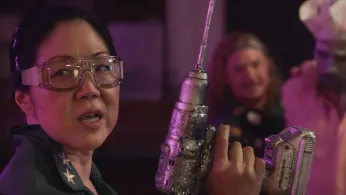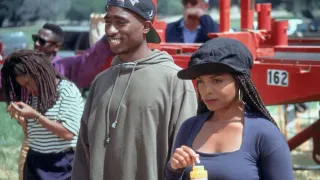
4 hours ago
Margaret Cho on Surviving the Apocalypse in Tina Romero’s “Queens of the Dead”
READ TIME: 4 MIN.
Margaret Cho, the acclaimed comedian and activist, sat down with Queerty to discuss her latest project, Tina Romero’s “Queens of the Dead”—a film that blends the outrageous spirit of queer nightlife with the visceral thrills of a zombie apocalypse. Cho’s reflections highlight the film’s deeper themes of resilience, chosen family, and the urgent need for LGBTQ+ joy in a tumultuous world
Director Tina Romero, daughter of legendary filmmaker George A. Romero, brings a distinctly queer sensibility to the zombie genre. “Queens of the Dead” is set during a Brooklyn drag club party that spirals into chaos when the undead arrive. Unlike traditional zombie films, Romero’s story centers on a found and sometimes fractured queer family, mostly from Bushwick, who must navigate both literal and metaphorical apocalypses—from addiction and corporate exploitation to the breakdown of communication in crisis moments.
Romero explained that she wanted her film to reflect the full generational spectrum of the queer community: Gen X, Millennials, and Gen Z. “Instead of having your token gay friend, we flipped the script so that we have all queers and then the one straight brother-in-law,” Romero said, emphasizing inclusivity and subverting genre norms.
The cast is a dazzling “queer Avengers,” featuring Katy O’Brian, Jaquel Spivey, Nina West, Margaret Cho, Dominique Jackson, Riki Lindhome, Jack Haven, Tomas Matos, and horror icon Tom Savini. This ensemble not only brings diverse representation but also delivers a spectrum of queer experiences rarely seen in mainstream horror.
In her Queerty interview, Cho reflected on the film’s central metaphor, noting, “In a way, a metaphorical zombie apocalypse is happening right now, and we’re trying to stay above it—and not get bit!”. For Cho, the film’s humor and camp are not mere entertainment; they are essential survival tools for LGBTQ+ people facing ongoing social and political threats. As she’s discussed in other interviews, comedy and queer politics are “absolutely linked,” providing both catharsis and resistance.
Cho’s character in “Queens of the Dead” embodies this ethos, using sharp wit and defiant joy to navigate danger. She emphasizes that the film’s party atmosphere is not just for the queer community but invites everyone to celebrate resilience and hope. “I want everyone to feel welcome in this movie,” Romero told The Curb, echoing Cho’s own views on inclusivity.
A major theme of “Queens of the Dead” is the concept of chosen family. In the film, survival isn’t about the lone hero—it’s about collective strength. “There is a way out of the apocalypse in the film, but a character says it’s only for family. The truth is that family is everyone there at the club,” Romero explained. This expansive notion of family resonates throughout the movie, challenging viewers to rethink community and solidarity in times of crisis.
Romero’s approach also reflects ongoing debates within the LGBTQ+ community about inclusiveness, generational divides, and internal conflicts. The film doesn’t shy away from depicting infighting and communication breakdowns but ultimately chooses an uplifting ending—one where the queer community survives and thrives because of mutual support.
“Queens of the Dead” arrives at a pivotal moment for queer representation in media. Its campy, horror-infused narrative builds on the legacy of queer-coded horror while foregrounding LGBTQ+ voices both in front of and behind the camera. The shoot itself was an act of queer creativity and resourcefulness, with guerrilla-style filming in Brooklyn’s Bushwick neighborhood and a cast and crew that were overwhelmingly LGBTQ+.
Nina West, another cast member, commented to Entertainment Weekly, “From the first day on set, I got to experience something so magical and so queer and so camp — I really can't believe that I get to be part of it. Nearly every single person on set was queer and telling this story from a very unique perspective that I think will take audiences on such a wild ride. And Tina is delivering something that is so unique and new and fresh and fabulous, but also so familiar. Her father would be so proud of her. She is taking this massive legacy and carrying that torch into completely new places. I can't wait for audiences to see this.”
Romero’s film doesn’t just pay homage to her father’s work; it reimagines the genre for a new era. By placing queer characters at the center of a zombie narrative and upending tropes like the “final girl,” Romero asserts that LGBTQ+ people deserve not just representation, but centrality in stories about survival and hope.
The film’s satirical edge also comments on the commodification of queerness, corporate exploitation, and the way mainstream culture often consumes LGBTQ+ identities without genuine understanding. Through its humor and heart, “Queens of the Dead” invites audiences to join the party—and to reflect on what real inclusion means.
Margaret Cho’s interview with Queerty, alongside the insights of Tina Romero and her cast, make clear that “Queens of the Dead” is more than a campy zombie romp. It is a celebration of queer joy, solidarity, and the power of comedy to resist despair. In a world that often feels apocalyptic, Cho and her co-stars remind us that survival is possible—not just through grit, but through laughter, community, and unapologetic self-expression.






